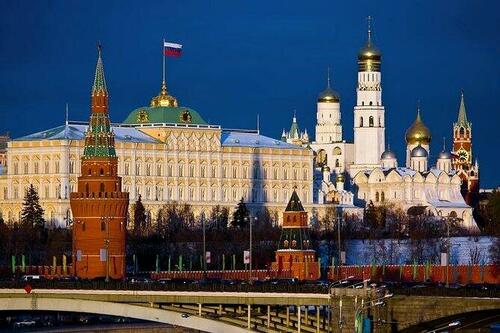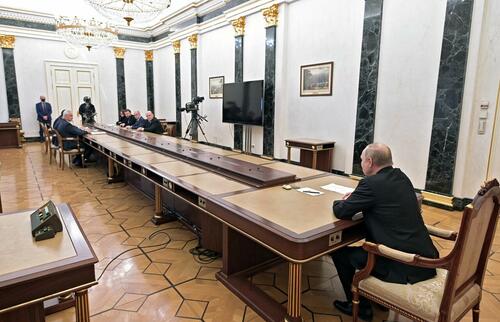
Back in 2020, a Kremlin spokesman addressed questions over whether President Vladimir Putin accesses the internet often to gain a sense of reporting on Russia and its actions from the outside world. At the time, the Kremlin revealed that "He doesn’t have a smartphone, it’s simply impossible." And this reportedly still hasn't changed.
Recently, speculation over Putin's daily habits related to how he accesses information or what sources he utilizes and whether the briefings his military and intelligence services provide are accurate has only grown due to the Ukraine war.
A fresh Wall Street Journal report has added to the ongoing speculation by saying that he avoids using the internet or electronic devices on fears that he will be spied on by Western intelligence agencies.
Instead, he reportedly is mostly reliant on physical paper reports which in some instances take days to reach his desk, after they are compiled by frontline commanders, and then passed through Russia's top intel bureaucrats and advisors.
The Wall Street Journal says it interviewed multiple current and former Russian officials for testimonies on which it is basing the conclusion. The report offers a portrait of an isolated president who remained "unable, or unwilling, to believe that Ukraine would successfully resist."
The WSJ sources emphasized that this isolation has resulted in inaccurate assessments of the real state of the battlefield, as briefings and reports are "carefully calibrated to emphasize successes and play down setbacks." His avoidance of technological means of information, as well as a wider array of 'information pipelines', has also made Putin "more dependent on briefing documents compiled by ideologically aligned advisers," according to the report.
"Front-line commanders report to the Federal Security Service, or FSB, the successor to the KGB, which edits reports for experts at the Security Council, who pass them to Council Secretary Nikolai Patrushev, the arch hawk who helped persuade Mr. Putin to invade Ukraine," the Wall Street Journal's sources claim.
The WSJ has further said this has resulted in some devastating and somewhat embarrassing 'bad info'-driven failures, for example in relating the following alleged bizarre episode:
Russian troops were losing the battle for Lyman, a small city in eastern Ukraine, in late September when a call came in for the commanding officer on the front line, over an encrypted line from Moscow.
It was Vladimir Putin, ordering them not to retreat.
The president seemed to have limited understanding of the reality of the situation, according to current and former U.S. and European officials and a former senior Russian intelligence officer briefed on the exchange. His poorly equipped front-line troops were being encircled by a Ukrainian advance backed by artillery provided by the West. Mr. Putin rebuffed his own generals’ commands and told the troops to hold firm, they said.

Of course, it should be pointed out that this type of 'cherry-picking' of intelligence to fit an established ideological narrative is nothing new in the history of intelligence agencies broadly in the world, or how leaders get informed. This is part of the well-known story of how the American public was lied into supporting the 2003 US invasion of Iraq, for example.
American intelligence officials as well as former Bush administration officials have since admitted that only those CIA and other agency assessments that confirmed to the narrative the neocons wanted to hear were presented at the White House.
As for Russia, it has rejected the new claims of Putin's supposedly limited access to accurate war-time information, with Kremlin spokesman Dimitry Peskov saying of Putin, "The president, as earlier, has multiple channels for receiving information." He added: "Any claims that he receives distorted information do not correspond to reality."
Back in 2020, a Kremlin spokesman addressed questions over whether President Vladimir Putin accesses the internet often to gain a sense of reporting on Russia and its actions from the outside world. At the time, the Kremlin revealed that “He doesn’t have a smartphone, it’s simply impossible.” And this reportedly still hasn’t changed.
Recently, speculation over Putin’s daily habits related to how he accesses information or what sources he utilizes and whether the briefings his military and intelligence services provide are accurate has only grown due to the Ukraine war.
A fresh Wall Street Journal report has added to the ongoing speculation by saying that he avoids using the internet or electronic devices on fears that he will be spied on by Western intelligence agencies.
Instead, he reportedly is mostly reliant on physical paper reports which in some instances take days to reach his desk, after they are compiled by frontline commanders, and then passed through Russia’s top intel bureaucrats and advisors.
The Wall Street Journal says it interviewed multiple current and former Russian officials for testimonies on which it is basing the conclusion. The report offers a portrait of an isolated president who remained “unable, or unwilling, to believe that Ukraine would successfully resist.”
The WSJ sources emphasized that this isolation has resulted in inaccurate assessments of the real state of the battlefield, as briefings and reports are “carefully calibrated to emphasize successes and play down setbacks.” His avoidance of technological means of information, as well as a wider array of ‘information pipelines’, has also made Putin “more dependent on briefing documents compiled by ideologically aligned advisers,” according to the report.
“Front-line commanders report to the Federal Security Service, or FSB, the successor to the KGB, which edits reports for experts at the Security Council, who pass them to Council Secretary Nikolai Patrushev, the arch hawk who helped persuade Mr. Putin to invade Ukraine,” the Wall Street Journal’s sources claim.
The WSJ has further said this has resulted in some devastating and somewhat embarrassing ‘bad info’-driven failures, for example in relating the following alleged bizarre episode:
Russian troops were losing the battle for Lyman, a small city in eastern Ukraine, in late September when a call came in for the commanding officer on the front line, over an encrypted line from Moscow.
It was Vladimir Putin, ordering them not to retreat.
The president seemed to have limited understanding of the reality of the situation, according to current and former U.S. and European officials and a former senior Russian intelligence officer briefed on the exchange. His poorly equipped front-line troops were being encircled by a Ukrainian advance backed by artillery provided by the West. Mr. Putin rebuffed his own generals’ commands and told the troops to hold firm, they said.

Of course, it should be pointed out that this type of ‘cherry-picking’ of intelligence to fit an established ideological narrative is nothing new in the history of intelligence agencies broadly in the world, or how leaders get informed. This is part of the well-known story of how the American public was lied into supporting the 2003 US invasion of Iraq, for example.
American intelligence officials as well as former Bush administration officials have since admitted that only those CIA and other agency assessments that confirmed to the narrative the neocons wanted to hear were presented at the White House.
As for Russia, it has rejected the new claims of Putin’s supposedly limited access to accurate war-time information, with Kremlin spokesman Dimitry Peskov saying of Putin, “The president, as earlier, has multiple channels for receiving information.” He added: “Any claims that he receives distorted information do not correspond to reality.”
Loading…







